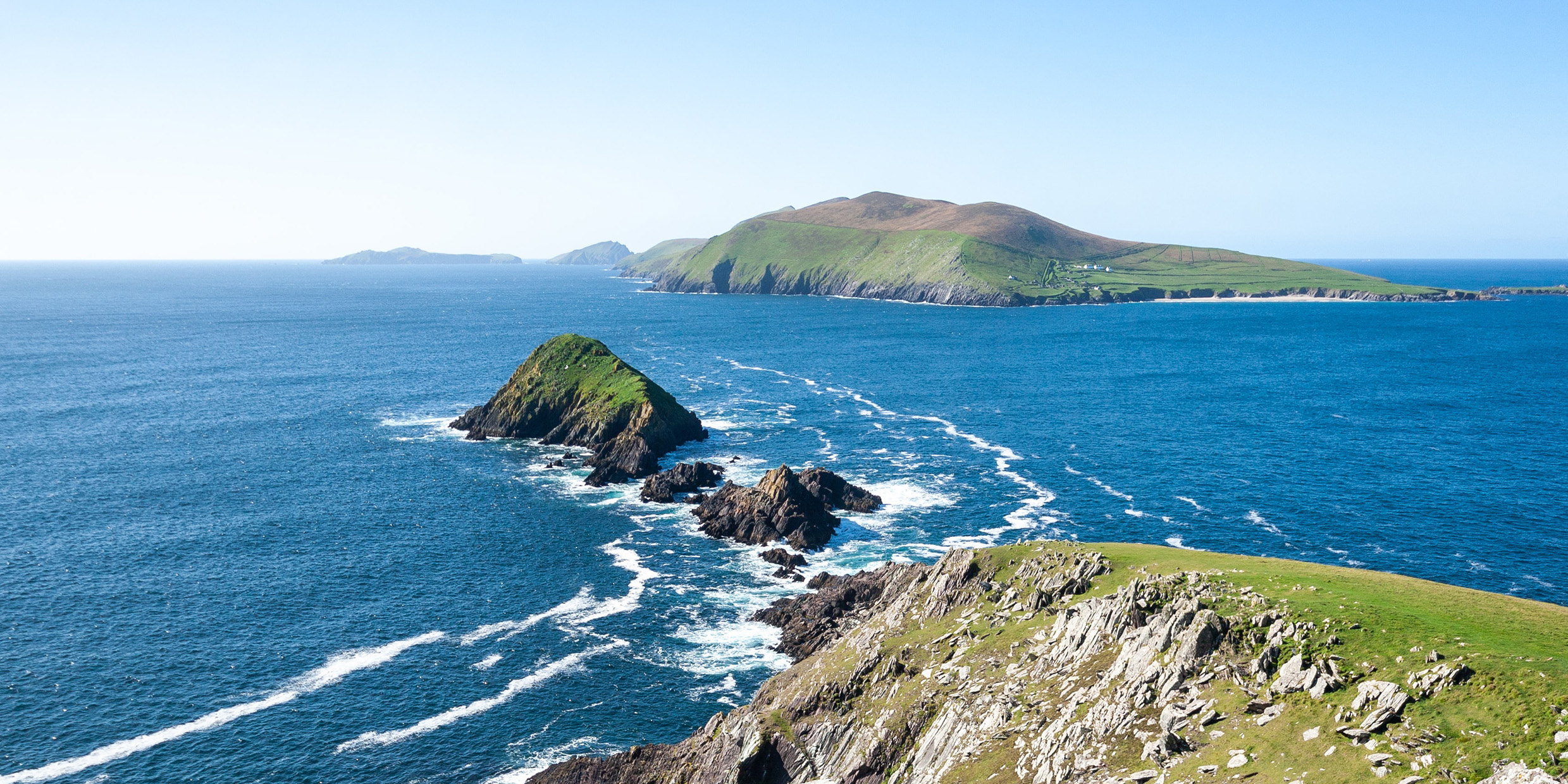Originally published 31 August 1992
Dunquin, Ireland — The Great Blasket Island lies a mile or so off the westernmost coast of Ireland. Until 1953, the island was home for a small, isolated community of Irish-speaking people, who lived on shipwrecks, herring, and potatoes, without benefit of electricity, telephones, running water, or even that most Irish of amenities, a pub. The island produced an astonishing flowering of Irish writing, including Maurice O’Sullivan’s Twenty Years A’Growing, Tomás Ó Criomhthain’s The Islandman, and Peig Sayers’s Reflections of an Old Woman. Perhaps no other acre of land on earth has evoked a more voluminous body of literature.
The Blasket and the nearby mainland coast are places of extraordinary natural beauty, desperately in danger of overdevelopment and despoliation. The island has been acquired by the Irish government as a National Park. Now, on the mainland cliffs looking out to the island, the Irish Office of Public Works is constructing an “interpretive center,” a sprawling structure that will contain exhibits on island life and culture, a cafe, a gift shop, toilets, and parking for the huge, double-decker tourist coaches that somehow manage to squeeze themselves along the narrow roads of Western Ireland.
Debate over the interpretive center has been vigorous, sometimes acrimonious, pitting neighbor against neighbor.
Opponents of the center believe its scale and location will destroy the very thing it is meant to interpret. Why, they ask, should tourists stand inside a building looking at the Blasket through a plate glass window, when they could be outside on the cliffs, experiencing the rock, sea, and air unmitigated by ersatz reconstructions of island life? Let tourists who truly care about the Blasket make the crossing to the island itself, visit the tumbledown houses where the islanders lived, and feel the salt spray and the sting of the wind, as did the islanders.
“Elitism!” say supporters of the center. What about people who are too young, old, or infirm to make the sea crossing? What about all those folks in tour buses? Why not let them learn about Blasket culture in the comfort of a dry, warm exhibit hall, while contributing their dollars, marks, francs, and pounds to the local economy?
The battle over the Blasket Island Interpretive Center has now been decided — in favor of the center — but it’s being repeated all over Ireland. The Office of Public Works wants to build interpretive centers in the heart of the limestone Burren, the Wicklow Mountains, and other places of exceptional natural beauty.
Ironically, both sides in these battles consider themselves environmentalists. The Office of Public Works believes it is discharging its responsibility to preserve and enhance the national heritage, opening areas of natural beauty to wider public appreciation. Opponents of the centers believe the fragile environments of these places are already severely stressed by overuse. The final straw, they say, will be caravans of tour buses disgorging hordes of tourists who want nothing more than postcards, cheap souvenirs, and a trip to the loo.
These battles in Ireland are skirmishes in a global war between preservationists and advocates of public access. Do airplane flights within the walls of the Grand Canyon provide the public with an unparalleled experience of nature, or does the roar of the engines destroy the silent essence of the canyon’s beauty? How many raft trips down the Colorado River are consistent with the canyon’s wilderness character? How many tourists can enter Yosemite Valley or Yellowstone National Park before those places are awash in sewage, exhaust fumes, and litter? Do all-terrain vehicles and snow machines facilitate access to wilderness, or do they destroy wilderness? Who has a right to experience wilderness — only sensitive environmental types with Eddie Bauer jackets and Vibram soles, or the masses?
I will confess that my heart sank when I saw the hulk of the Blasket Island Interpretive Center rising on a stretch of coastal cliffs so beautiful and unspoiled that it was used as a setting for the films Ryan’s Daughter and Far and Away. As a person of democratic principles, I balk at denying anyone access to natural beauty, and I appreciate the fact that a majority of local opinion was apparently in favor of building the center. At the same time, I know that something precious and irreplaceable has been lost.
Until his death in 1953, Ireland’s preeminent naturalist, Robert Lloyd Praeger, visited every corner of the nation, cataloging the rocks, plants, animals, and archeological riches. A botanist, geologist, and archeologist, he traveled “mostly on foot, sometimes by cycle, seldom by car,” for that, he says, is the only way to know intimately any country. His account of his travels, The Way That I Went, affirms the value of “stopping often, watching closely, listening carefully.”
The person who would stop, watch, and listen has ample opportunity to visit the Great Blasket Island aboard one of the several small boats that ply the waters between the island and the mainland, and interpretation is readily available in the splendid works of literature the island produced. Let the the folks who want an ersatz experience of nature or folk culture go to Disney World, or the regional equivalent, and leave our most precious areas of wilderness alone.
If that is elitism, so be it.
The Blasket Centre, which opened in 1993 on the mainland across the bay from the Great Blasket Island, has proved to be a successful education center for Irish language and culture, allaying many early concerns expressed during its construction. The Great Blasket Island itself has remained untouched and unspoiled. ‑Ed.



